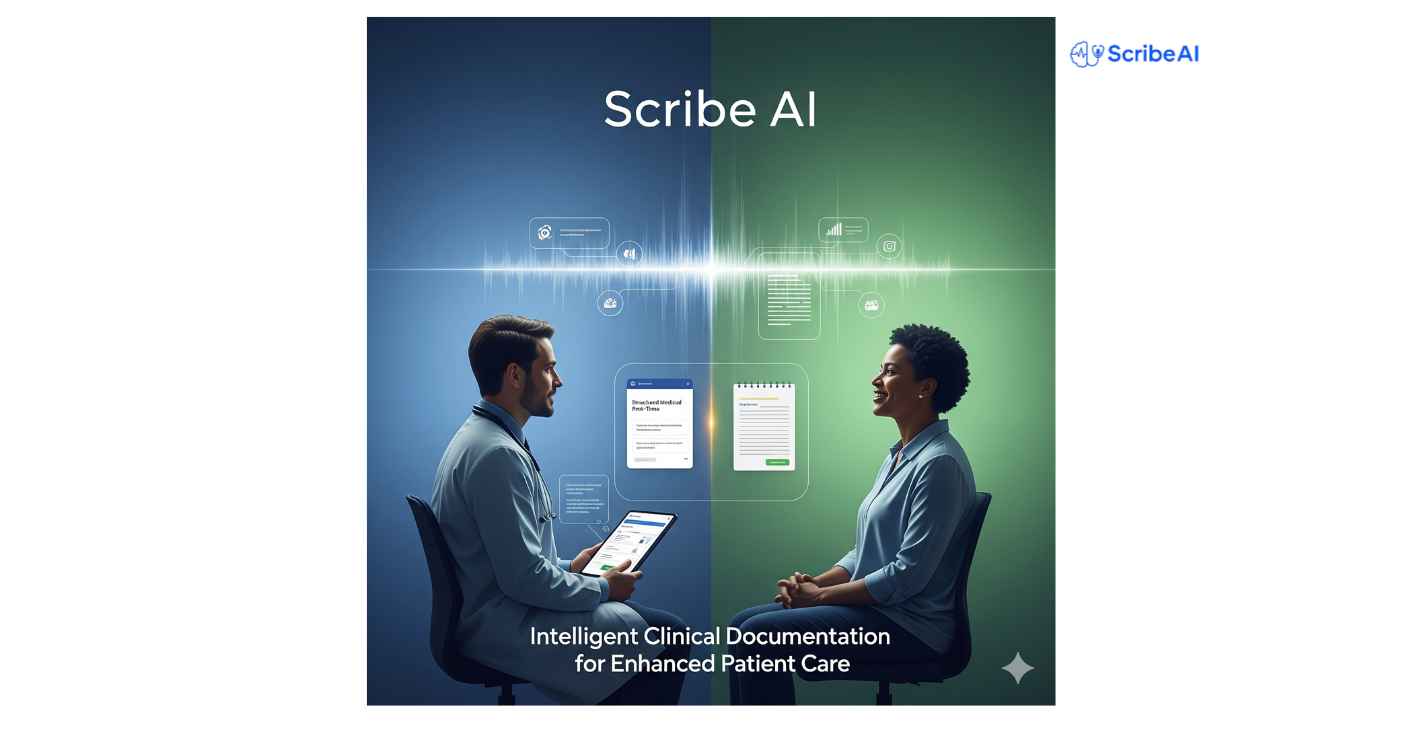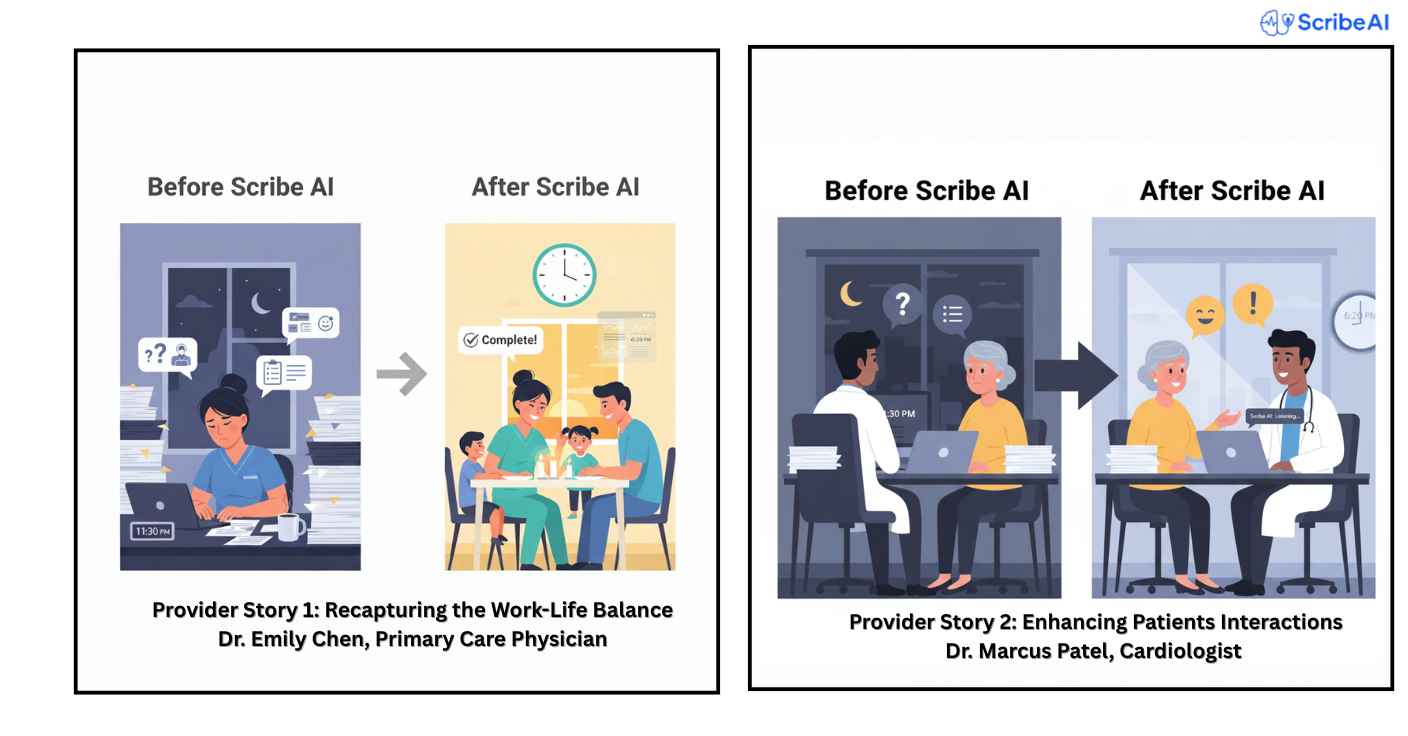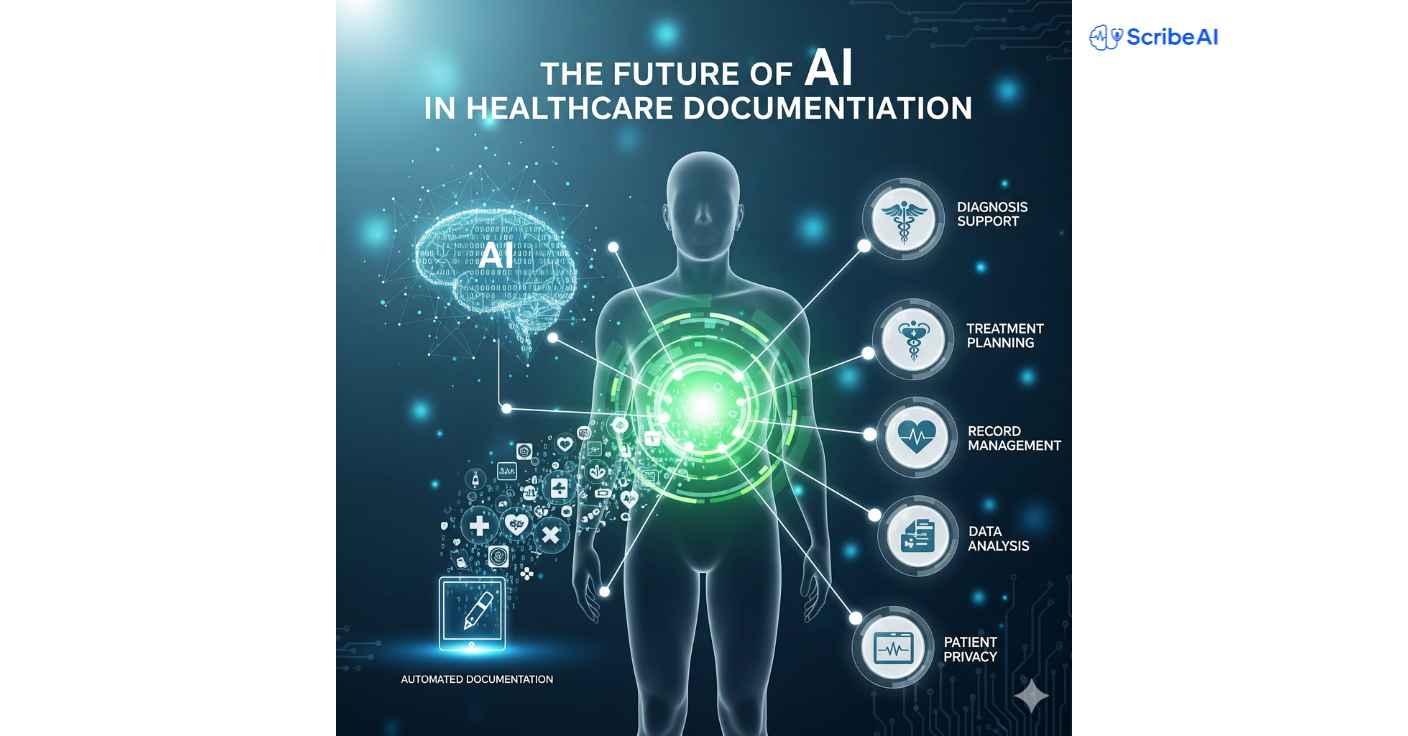The Increasing Documentation Scraps
It is always good to get the context before getting into provider stories. The U.S. healthcare professionals dedicate up to 50 percent of their time to data input in the EHR systems. It means that it translates into long evenings, as doctors complete their clinical notes at home instead of relaxing, spending time with their families, or getting ready to the following day.
The Paper Reduction Act was intended to reduce unnecessary paperwork, and yet the regulations, billing guidelines and compliance mandates are stacking up. It has formed a loop where the clinicians are overworked, patients are not heard as much and the healthcare is inefficient.
Enter Scribe AI: A Game-Changer in Clinical Workflows
Medical documentation AI is not the replacement of medical practitioners; medical practitioners are empowered. Scribe AI is a provider-patient conversation AI that listens to and generates accurate, structured clinical notes in real time. With natural language processing and deep healthcare integration, it:
- Captures patient encounters with high accuracy.
- Summarizes visits in seconds.
- Removes manual typing in the process of consultation.
- Directly syncs into EHR.
- Provides clinicians with more face-to-face time with patients.
Thousands of hours have been saved through this technology already in primary care, specialty practices, and hospitals. Still, though, it is life-changing stories of the real providers behind the numbers that reveal the life-changing effect.

Provider Story 1: Recapturing the Work-Life Balance
Dr. Emily Chen, Primary Care Physician
Dr. Chen spent two or three additional hours at the end of each day (in the evening) finishing her medical paperwork. Having a full patient panel, this could easily translate to the inability to eat with her family and being burnt out. She states that she is saving an average of two hours a day after using Scribe AI.
I now have my evenings back, I've been feeling that. I go out of the clinic on schedule with the confidence that my notes are already complete and correct. I feel less stressed out, and I will be able to demonstrate greater presence at work and home. The example of this story shows that AI medical scribes have one of the largest benefits: restoring balance and decreasing burnout. Providers will be able to remain caregivers, not clerks, by reducing documentation.
Provider Story 2: Enhancing Patients Interactions
Dr. Marcus Patel, Cardiologist
As in the case with Dr. Patel, time was not the only obstacle, but patient trust. “I disliked the fact that patients were talking about something so personal in my face as I stood in front of a screen. It created a barrier."
Having Scribe AI doing the work of taking notes, Dr. Patel can finally make direct eye contact with the patients. It has changed how I relate with patients. They feel heard. And that not just enhances the healthcare patient experience but also adherence to treatment plans. AI resources allow providers to build better relationships by allowing them to work with people rather than paperwork, which has a direct correlation with patient outcomes.
Provider Story 3: Enhancing Accuracy and Compliance
Dr. Sarah Alvarez, Family Medicine
The legal and clinical implications include the accuracy of documentation. Lack of information or coding mistakes may threaten the quality of care and reimbursement. Dr. Alvarez explains:
“I used Scribe AI and sometimes I missed little yet significant details when I was in a hurry to go through notes. The system now captures all in real time and I am able to review within a short time and sign. My graphs are more comprehensive and it is easier to comply.”
In case of medical documentation practices that need to meet stringent requirements of the Paper Reduction Act and HIPAA, the availability of a trustworthy AI is a backup policy against mistakes.

The Ripple Effect: System-Wide Benefits
Although the well-being of the providers is a significant outcome, the effect is spread throughout the healthcare ecosystem:
- Better Patient Care: There is more time listening and diagnosing by clinicians.
- Improved Patient Experience: Patients note that when providers are communicating with them one-on-one, they feel that they are valued.
- Enhanced Patient Outcomes: With improved communication, adherence is enhanced and misunderstandings are reduced.
- Practice Efficiency: This saves on time in administration and maximizes patient throughput.
- Data Quality: Higher quality and organized healthcare data enhances research, analytics, and care coordination.
Evidence from Research
These provider stories are in line with recent studies:
- A NEJM Catalyst study discovered that AI medical scribes could save thousands of clinician hours each year by saving almost 70 percent of the time on documentation.
- A report released by a Mayo Clinic revealed that they saw a 30 percent decline in after-hours charting, which directly decreased physician burnout.
- Practices that implemented AI scribes achieved a better patient satisfaction score, especially in measures of.
These data points added together prove what the real providers are witnessing: Scribe AI enables clinicians to regain the time and improve the quality of care at the same time.
Resolving Concerns: Accuracy, Privacy, and Trust
Naturally, there are questions in adopting AI to medicine. Providers often ask:
- Is it accurate enough? It is clinically verified that now AI scribes are more than 95 percent accurate on structured clinical notes.
- What about privacy? HIPAA-compliant Scribe AI systems are encrypted and can be easily integrated securely.
- Will AI replace clinicians? No. AI applications are used to assist and complement human knowledge but not to make clinical decisions.
Openness and adherence to regulations such as the Paper Reduction Act mean that Scribe AI will improve rather than damage the provider-patient relationship.
Future of AI in Healthcare Documentation
In the future, the medical documentation role of AI will continue to increase. Beyond transcription, future systems will:
- Suggest diagnostic codes automatically.
- Track longitudinal patient histories.
- Generate care plan recommendations.
- Support predictive analytics for population health.
This change will allow healthcare documentation to transition to an asset and a driver of smarter care delivery rather than remain a burden.

The case of Dr. Chen, Dr. Patel and Dr. Alvarez illustrate the practical importance of Scribe AI. AI medical scribes are not a technological update, but a life-saving tool in the face of contemporary medicine by cutting down on the volume of documentation, increasing accuracy, and reestablishing provider-patient relationships. Clinicians recapture their time. Care of patients is improved. Efficiency of practices is enhanced. And the health system in general gets a step closer towards the objectives of efficiency, trust, and outcomes. Scribe AI is not a substitute to the human touch in medicine but rather a way to safeguard it.
Are you willing to award your clinicians their time? Learn how Scribe AI could help make your healthcare documentation process easier, lessen burnout, and improve the healthcare patient experience within your organization.
Need to learn more about how Scribe AI can revolutionize your practice? Get in touch with Tecosys today to discuss how our AI-driven documentation system can be easily integrated into your processes and benefit your providers.
Frequently Asked Questions:
Q1. Is Scribe AI safe and HIPAA compliant?
Yes. Scribe AI is developed according to the HIPAA requirements and data encryption on all levels. Your patient data will be private and confidential.
Q2. What is the accuracy of Scribe AI in the clinical notes?
The Scribe AI has been clinically proven to deliver greater than 95 percent accuracy in organized clinical notes, eliminating a great deal of error caused by manual handwriting.
Q3. Will AI take the place of clinicians?
No. AI is not created to substitute providers. Clinicians are not deprived of the autonomy of medical decision-making and ultimate documentation.
Q4. Does Scribe AI work with existing EHR systems?
Absolutely. Scribe AI will be integrated with major EHR systems to fit seamlessly to ensure no current operations are interrupted during implementation.
Q5. What are the areas of application of Scribe AI?
Whether it is primary care or a specialty such as cardiology, family medicine, and others, any type of provider requiring large volumes of documentation can leverage the capabilities of Scribe AI.
Q6. How soon will clinicians get results?
Several providers state that they save as much as 2 hours a day during the initial weeks of Scribe AI application-time that can be spent on patient care or personal health.